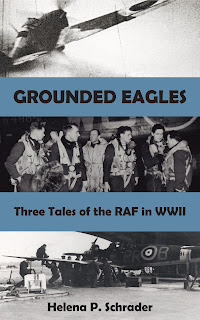The pilots of Fighter Command -- Churchill's "few" -- may have been the tip of the spear, but they could not have won the Battle of Britain on their own. Fundamental to British success in the summer of 1940 was the system of controlling the limited number of fighters available to the RAF. By linking the radar stations to command and control centers where the enemy aircraft were plotted and their intentions deduced, the RAF was able to deploy their resources sparingly and effectively. To highlight this critical aspect of the Battle, an important character in "Where Eagles Never Flew" is one of the controllers.
Ft/Lt Christopher "Bridges" Bainbridge - RAF Controller
Excerpt:
It was noon and the next raid was building up over Calais again. Bainbridge started to suspect that the Germans had concentrated their forces over the Pas de Calais. Otherwise, they couldn't mount so many raids in one place in such quick succession. Park would have to ask Tangmere Sector for support soon. Bainbridge's eye wandered nervously between the boards below and the telephone connecting him directly to Park's HQ at Uxbridge. The raid moved inland. Manston again. This time communication to and from the airfield was knocked out.
Bainbridge stood and went to the railing of the gallery to stare at the map below. He tried to picture the coastline from Hastings to Ramsgate. That, apparently, was where the German army intended to force its way ashore. Hastings would undoubtedly appeal to the superstitious dictator, Bainbridge thought flippantly -- but without real levity. Someone had brought him a tray with lunch and he had not eaten a single bite. "Aren't you going to eat, sir?" ACW Roberts asked.
"No, you can take it away." She seemed to do so reluctantly.
"Bridges", like most of the early controllers, was himself a pilot -- until a motor accident robbed him of one eye. Now, no longer judged fit to fly by the RAF medical establishment, he has been hastily retrained to serve as a "Sector Controller." All information from radar stations and the Observer Corps (which provided information not available from radar and of aircraft already in British airspace) was first sent to Fighter Command Headquarters at Bentley Priory. There it was filtered for duplication and other errors and then sent out to the "Sector Airfields." These controlled up to four fighter squadrons. The Sector Controllers were responsible guiding the aircraft based in their sector to interceptions with the enemy.
When Bridges arrives at Tangmere he feels like a fish out of water. He no longer belongs to a squadron. Because of his injuries, he is no longer "one of the boys" either. He is a stranger in his own mess. Yet his job is critical and he soon realizes this. Before too long, the men flying know his voice and come to trust him, confident that he will do all he can to guide them to their prey -- and warn them of their predators. The relationship between Bridges and the squadrons he "controls" becomes strong.
Yet although he has only one physical eye, his job places him in a position to see more than the sharp-sighted young men flying Hurricanes. He can see the wider picture. The attacks and the feints of the enemy. He can form a picture of what they are attempting to achieve. He knows when they succeed and when they fail not just in the individual struggles of his squadrons but across the south coast of England.
Bridges role in "Where Eagles Never Flew" is to give the reader greater insight into overall developments and the wider picture -- as it looked at the time without the benefit of hindsight.
Excerpt continues:
Hastings was too far west, Bainbridge decided on second thought. If they were going to land at Hastings, they would be concentrating more in the Kenley and Tangmere Sectors. They must be planning to land nearer Dover. Land below the chalk cliffs? Were there cliffs all along the coast? Bainbridge was from Somerset and didn't known the south coast well. H was so lost in reflections about the impending invasion that he was taken by surprise when a plot went on the board at Cherbourg.
That would be fore them. He glanced at the clock; it was 3.40 pm. OK. Watch that carefully. Park wouldn't want them to scramble too soon. It was still building up. 100+ already, but the escorts were not doubt still joining up and circling the bomber squadrons.
Farther east, another raid was moving out of Calais again. Communication, meanwhile, had been restored to Manston. All accommodation had been leveled, and the airfield was so littered with unexploded bombs (aircrew error, and indication of declining German industrial efficiency, or an intentional new tactic?) that it was no longer usable. The order went out to the Manston squadrons to withdrew to Hornchurch.
Bainbridge noted: 15:45, August 24, 1940. The Germans achieve their second clear victory in the air war: they deny Fighter Command one of its forward airfields."This is the best book on the life of us fighter pilots in the Battle of Britain that I have ever seen.... I couldn't put it down."-- RAF Battle of Britain ace, Wing Commander Bob Doe.
Winner of a Hemingway Award for 20th Century Wartime
Fiction, a Maincrest Media Award for Military Fiction and Silver in the Global Book Awards.
Find out more at: https://crossseaspress.com/where-eagles-never-flew
they took the war to Hitler.
Their chances of survival were less than fifty percent.
Their average age was 21.
This is the story of just one bomber pilot, his crew and the woman he loved.
It is intended as a tribute to them all.
or Barnes and Noble.

For more information about all my books visit: https://www.helenapschrader.com





No comments:
Post a Comment